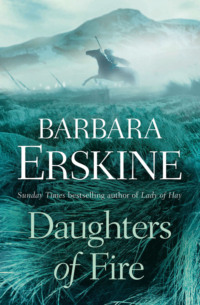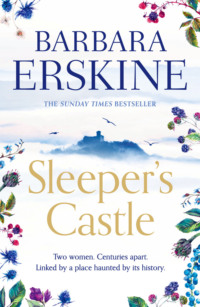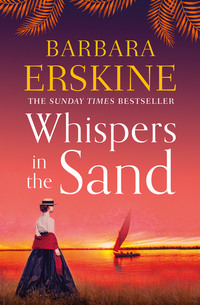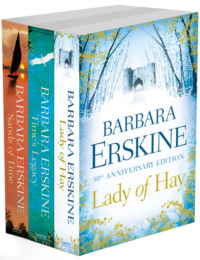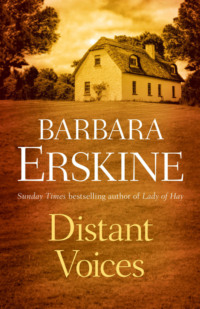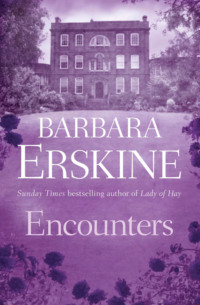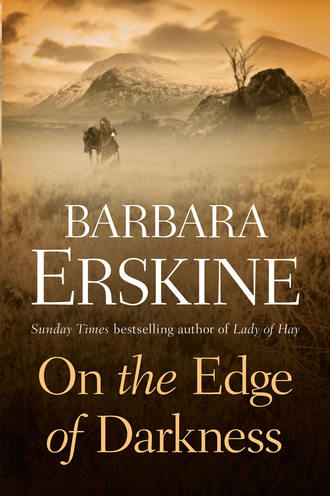
Полная версия
On the Edge of Darkness
Adam had a strange cold feeling in the pit of his stomach. ‘Brid, what are you talking about? Your mother and Gartnait would never leave you. Your uncle would never kill you. This is nonsense. All of it.’
‘Nonsense?’ she echoed wildly. ‘Broichan is the chief priest of this land. His word is the law. Even the king would not defy him if it was over a matter of the gods.’ Her eyes hardened again and he recoiled. ‘A-dam, don’t you see, you have to save me! I have to live in your world now. I am going to come with you. To your school in Edinburgh!’
‘No!’ Adam stepped back further. ‘No, Brid. I’m sorry, but you can’t. It’s impossible.’
‘Why can’t I?’ Her eyes were fixed on his face.
‘Because you can’t.’ He was filled with horror at the idea.
‘You can’t stop me! A-dam, I have nowhere else to go.’
‘Go with Gartnait and Gemma. You belong with them.’
‘I can’t. They have gone to the south.’
‘Then you must follow them. This is nonsense. Brid, I can’t take you to Edinburgh! I’m sorry.’
‘But you love me, A-dam.’
‘Yes …’ He paused. ‘Yes, I love you, Brid.’ It was the truth, but at the same time, he realised suddenly, there was a part of him which would be quite glad never to see her again. Her angry outbursts and her possessiveness, her wild declamations, had become alarming. And at the same time there was a part of him which had already begun to separate itself from Pittenross and everything there. He softened his voice. ‘Our love is for here. For the holidays. There is no place for you in Edinburgh. None at all.’ He hesitated. ‘Brid, women are not allowed where I’m going.’ He did not like to lie but in a way it was the truth. Robbie had found them digs to share off the High Street and one of the landlady’s conditions was, ‘nae young women’. Sharing the digs there would be only one other, a skeleton Robbie had bagged for him from a newly qualified doctor. The story was that the skeleton, known as Knox, had been divested of its skin and flesh by the young man himself who had now headed south for London to become a dermatologist.
‘Brid.’ Adam took a deep breath and caught her hands gently in his own. ‘You have to go back. I’m sorry. You know you aren’t really in danger.’ He deliberately closed his mind to the picture of Broichan with this cruel eyes, wild hair, and savage, tight-lipped mouth. ‘That was all a wonderful fantasy. A game we played when we were children.’ He frowned. ‘Brid, there’s a war about to start. I’m going to be a doctor. Please understand.’ He touched her face gently. ‘It’s just not possible.’
‘A-dam …’ Her face was ashen. ‘War does not matter to me. I will help you with the wounded. Please. I love you.’ She grabbed the front of his sweater. ‘If I go back I will die.’
‘No, Brid.’
‘A-dam. You do not understand.’ She was clinging to him, her face hard.
‘Brid, I do. Listen. You have to go back to find Gartnait and Gemma. Next holidays we’ll meet and we’ll compare notes, all right? You must understand. You cannot come with me.’
She let go of him so suddenly he staggered backwards. Through her tears her eyes were blazing. ‘A-dam, I will never let you go. Never!’ Her voice was almost vicious.
Adam stared at her, shocked. The skin on the back of his neck was prickling suddenly, but he managed to remain calm. ‘No, Brid, I’m sorry.’ He stepped away from her. ‘Please, try and understand.’ He could not bear the look in her eyes any longer.
He turned and began to run as fast as he could down the hillside, away from her.
6
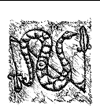
The digs were situated up a curved stair in a narrow wynd of tall grey corbelled houses off the High Street. Adam felt an initial wave of intense claustrophobia as he surveyed his new domain, with its small hard bed, empty bookshelf and wobbly table, and then, seeing it instead through Robbie’s proud eyes he shifted his point of view and saw it as a haven of independence.
Throwing his bags down on the bed, next to which lay his trunk, he raised his hands above his head and gave out an exultant shout of freedom. They were, Robbie told him gleefully, just ten yards from the nearest pub. In the corner the skeleton of Knox grinned amiably at him. Within seconds it had acquired a hat and a university scarf, the box containing Adam’s gas mask was slung irreverently round its shoulders – it was only days after Chamberlain had returned from Munich and the threat of war had receded once more – and the two young men had pelted back down the stairs to sample a pint of Tennent’s. It was the first time that Adam had ever been in a bar.
It was a path they were to tread many times over the next few months between the exhausting rounds of lectures; in Robbie’s case they took place in the Old Quad, and in Adam’s in the new buildings in Teviot Place for chemistry, anatomy and dissection, in the Botanical Gardens for botany and in the King’s Buildings for zoology. After the initial strangeness of university life, and the shock of having so much freedom away from the deadening atmosphere of the manse, he took to the course like a duck to water, avidly soaking up each subject as it came, taking little time out to look for recreation. Once a week he wrote a dutiful note to his father. His mother he went to see at last.
She had changed out of all recognition. Gone was the tightly pulled-back hair, the sober dresses, the strained, pale face. When he walked hesitantly into the tea shop on Princes Street where they had agreed to meet he stood for a moment staring round, his gaze passing over the vivacious pretty woman with the swinging curly hair and fashionable hat who was sitting near him, already presiding over a teapot and a plate of cakes. Only when she stood up and held out her arms did he look into her eyes and see there the love and fear and compassion and feel the overwhelming rush of emotion which brought tears to his own eyes.
‘I wrote, Adam. I wrote often, my darling.’ She was holding his hand openly on the tabletop, playing obsessively with his fingers as though reassuring herself that they were all there. ‘You must believe me. You do understand? It’s not your father’s fault. He is such a good man. He must have thought it best if you didn’t get my letters.’ She looked away suddenly and he saw the pain; the glint of a tear on her eyelashes. ‘I wasn’t good enough for him, Adam. I’m weak. I needed things …’ She couldn’t speak for a moment and busied herself pouring more tea for him, her hand shaking slightly. ‘I was suffocating, Adam. I felt as though I would have died.’
He didn’t know what to say. Smiling at her silently he squeezed her hand and buried his face in his cup.
She was blowing her nose on a lace-trimmed handkerchief. After a moment she looked up at him and smiled. The tears had gone. ‘So. Are you going to be a good doctor?’
He grimaced. ‘I hope so.’ He withdrew his hand to stir some sugar into his cup. ‘If I am, it’s because I learned it from you. Visiting all those poor people in the parish. Hating to see them suffer. Wanting to help them.’
He looked down into his tea, distracted suddenly by a memory of a young man lying beneath a tree. Gartnait, with Brid’s small hands busy tending his wound. How strange. He had not given her a thought since he had been in Edinburgh.
He looked back at his mother. Her face was sober. ‘I hated all that. The visiting. I had no idea, when I married, what it entailed – being a minister’s wife.’ She paused, not noticing the crestfallen disillusion in her son’s eyes. ‘I’ve met someone, Adam. A good, kind, gentle, understanding man.’
Adam tensed. He didn’t want to hear this.
‘I hoped your father would divorce me. I was the guilty party.’ She glanced at Adam and looked away again. ‘That way I could marry again.’ She refused to meet his eye. ‘But of course he can’t do that, being in the church, so, I – well, I’ve had to pretend.’ She was staring down at her hands. Almost unwillingly Adam looked down too and saw that the narrow gold wedding band had gone. Instead she wore a ring of carved twisted silver.
‘I am sorry, Adam. I will understand if you hate me for it.’ She was pleading, still not looking at him.
He bit his lip. He wasn’t sure how he felt. Anger. Hurt. Rejection and yes, hatred, but not for her, for the unknown man who had stolen her from them.
He cleared his throat nervously. ‘Are you happy now?’
She nodded.
Again he looked away. She was happy! Had she ever really wondered how he was, imagined his loneliness, his desolation when she left? He found himself suddenly near to tears, remembering Wee Mikey’s teasing. The boys in the village had been right all along. She had gone off with another man. She was, as his father said, a whore.
He stood up abruptly. ‘I have to go, I’m afraid.’ He schooled his voice with care.
‘Adam!’ She looked up at him at last, devastated.
‘I’m sorry, Mother.’ He didn’t even know what to call her, he realised suddenly. Not Mummy. Never Mummy. Not any more.
‘We will meet again, Adam? Soon?’ There were tears in her eyes again.
He shrugged. ‘Perhaps.’ Suddenly he couldn’t bear it a moment longer. Turning, he blundered out between the tables and almost ran into the street.
Jeannie Barron baked less often now. She had agreed to stay on after Adam left; the minister’s needs were very meagre and the house very quiet. Her work did not take her so long, and it was cheerless without Adam there. So it was with some pleasure that she looked up at the knock on the kitchen door and saw the pretty face with its frame of long dark hair peering round at her.
‘Brid, my lass. How nice to see you.’ She smiled and beckoned the child in. But she wasn’t a child any longer. As Brid sat down at the kitchen table and fixed Jeannie with a cold stare the woman felt a shiver of apprehension whisper over her skin. ‘So, how are you? You’ll be missing Adam, as we all are,’ she said slowly. She turned the dough and thumped it with her fist.
‘You will tell me where he is.’ Brid’s eyes, fixed on hers, were very hard.
Jeannie glanced up. ‘Did he not tell you where he was going?’ Alarm bells rang in her head.
‘He tells me he is going to Edinburgh to study healing.’
‘Aye, that’s right.’ Jeannie smiled, relaxing again. ‘He’s very bright is our Adam.’
‘I will go too.’ Brid folded her arms. Her expression had not changed. ‘You will tell me how.’
‘How to go to Edinburgh? That’s difficult.’ Jeannie was playing for time. If Adam hadn’t given the girl an address to write to then he had a reason. ‘It costs money, lass. You’d need to go on the bus or on the train.’
Brid looked blank.
‘Why not wait until he comes home in the vacation? It’s not so long. He’ll be back before you know it. Besides, he hasn’t written to tell us yet where he’s staying.’ She hoped she would be forgiven the lie. ‘Edinburgh is very big, lass. Bigger than you can ever imagine. You would never find him.’
‘I will ask. The people will know where the healers’ school is. You will give me money.’
Jeannie shook her head. ‘No, Brid. I’m sorry. I can’t afford to hand out money, lass. You must find your own.’
‘I will have yours.’ Brid had spotted Jeannie’s handbag on the dresser. Pushing back her chair she moved towards it, putting out her hand.
‘No!’ Jeannie had seen what was coming. Stepping away from the table she grabbed it, covering it in flour. ‘No, miss! I had a feeling you were no better than you ought to be. You get out of here now. This minute, or I’ll call the minister! If you want to go to Edinburgh you go your own way, but I warn you, you’ll not find Adam. If he wanted you to know where he was he would have told you. So, that’s an end of it, do you hear me?’
For a moment there was total silence in the room. Brid stared at her with eyes of flint and Jeannie felt a jolt of real fear. She swallowed hard. The minister was actually not in his study. She wasn’t sure where he was. Visiting someone in the parish, perhaps, or in the kirk. She straightened her shoulders. Brid was only a slim wee thing. Why should she feel so afraid?
She read the fatal message in Brid’s eyes for just one second before Brid put her hand to her leather belt and calmly drew her knife. She tried to run, but it was too late. The beaten and polished iron weapon caught her between the shoulderblades before she had taken more than one step and she fell awkwardly, clutching the bag to her chest as the blood slowly welled out over her pale blue cardigan. The only sound she made was a small gasp.
Brid stood still, amazed at the incredible surge of energy and excitement which had shot through her. Then, expressionless, she wrestled the bag from Jeannie’s clutch and opened it, tipping the contents on the floor. She surveyed the items with interest. There was a little round mother-of-pearl powder compact, given to Jeannie by Adam’s mother when she realised that the minister would not allow her to keep such a frivolity. A comb. A handkerchief. A small diary. A purse and a wallet. She ignored the wallet, which contained a large white five-pound note, not recognising it as money. The compact she took and examined. She pushed the small catch on the side and gasped as it opened to reveal a mirror. For a moment she stared at herself, rapt in wonder, then, hastily, she tucked it inside her dress. Then she reached for the purse. Inside were nine shillings, three sixpences, four pennies and a ha’penny. She hoped it was enough to go to Edinburgh.
Adam met Liza when she was drawing his corpse. Dissection fascinated him. It was meticulous, delicate and the structures of skin and muscle and organ that he uncovered were beautiful beyond anything he had ever imagined. The young men who shared his class joked and complained about the smell of formalin and messed about to cover their unease at what they were doing, but Adam was completely enchanted. They thought he was mad; a bit of a swot. Only Liza understood. She arrived one morning, a large portfolio under her arm, her bright clothes and long, flame-coloured scarf a shocking contrast to the dark walls and the sober overalls of the young men.
She smiled at them from huge, amber-coloured eyes and tossed her long auburn hair back over her shoulders. ‘Do you mind if I draw your body?’ She was already setting up her easel just behind Adam’s elbow. Their supervisor was ostentatiously looking in the other direction. ‘I won’t get in your way, I promise.’
Adam was astonished. The women’s dissection room was separate from the men’s across the corridor. His surprise turned to irritation. She must have bribed a servitor or one of the lecturers to get in and she was a distraction. She made his colleagues, never serious at the best of times, behave in an even more silly fashion than usual. She herself though was as serious as he was, scowling with concentration as she sharpened her pencils and drew with meticulous detail the facial structures beneath the skin.
It was she who suggested that Adam have a cup of tea with her after the session. ‘You take your work seriously. Much more than the other boys.’ She smiled at him gravely. ‘Are you planning to be a surgeon?’ There was a faint accent there, attractive, lilting. He could not place it.
He shrugged. ‘I’ve always assumed I’ll be a GP. I like people. When you’re a surgeon they’re always asleep. Or so you hope.’ He gave a slow smile. He had grown up a great deal in the first months of his new life.
She responded dazzlingly. ‘In a way it’s a pity. You’ve got wonderful hands.’ She reached across the table and took one, opening it palm up and looking at it through narrowed eyes. ‘Your life line is very strong.’ She traced it with her fingertip. ‘And look, there will be three women in your life.’ She glanced up at him under her eyelashes, laughing. ‘Lucky women!’
Embarrassed, he pulled his hand away, feeling the colour rising in his cheeks. ‘Where did you learn to hand read?’ His father would have had fifty fits.
‘From my mother. I inherited my art from my father.’ She pulled the sugar bowl towards her and drew patterns in the crystals with the spoon. ‘I’m studying to be a portrait painter. But I need to know how the whole body works. However much you observe and notice the colour and the texture and the shadows of the skin, unless you know about the musculature and bones underneath, you’re not going to get the depiction strong enough.’ She paused and a shadow crossed her face. ‘It’s still hard for women, you know. They made an awful fuss about me wanting to come and draw your corpse this morning.’
‘Did they?’ He was beginning to fall under her spell. ‘I expect they thought you would distract us.’ He grinned. ‘You did. Why didn’t you go to the women’s class?’
She smiled. ‘I tried. They were much stricter. No outsiders. I didn’t distract you though. You were the serious one.’
‘I think I’m a serious person.’ He shrugged self-deprecatingly. ‘But I’ve one or two chums who are working very hard to reform me.’
‘Good. Let me help. Do you want to come round to see my studio?’
He nodded. He was beginning to feel extremely happy.
She did not reappear in the dissecting room but it was arranged that he would go to visit her the following Saturday.
It was on the day before that he received a letter from his father telling him about Jeannie Barron’s death.
The police can find no motive. It is completely senseless. Her handbag was rifled, but the blaggard left her wallet. He took her purse and her powder compact as far as we can guess. From what Ken says she used to keep them in there. They haven’t found the weapon. No one saw anything or heard anything …
The minister’s anguish poured off the page but Adam had stopped reading. He was crying like a child.
He almost didn’t go to Liza’s, but he had no way of getting in touch with her and in the end he was glad to get out of his rooms. Robbie’s shocked anger at what had happened – he too had known Jeannie since he was a little boy – didn’t help, nor did his way of dealing with it, which was to go out and get very drunk.
The studio was in an old loft overlooking the Water of Leith. Adam climbed the narrow dark stairway and knocked on the door, completely unprepared for the assault on his senses which the opening of the door provoked. The huge single room where Liza lived and worked was flooded with light from two floor-length windows. More than three-quarters of the floor space was given over to a studio, the bare boards splashed with paint, two easels in place, one with a picture, covered with a cloth, the other bearing a half-finished portrait of an old man. A large refectory table was barely visible under paints and pencils and palettes, knives and brushes and on a plate in one corner, Adam couldn’t help but notice with a slight shudder, there was a sandwich liberally sprouting a rather pretty green mould.
Liza’s living corner in contrast was far from spartan. The divan bed was covered in a scarlet bedspread; there were cushions and Victorian silk shawls, bright rag rugs, and an old hatstand where hung her supply of long gypsy skirts and shirts and jumpers. On the other side of the space was a small gas ring and a large chipped enamel sink. ‘Home!’ She welcomed him with outflung arms. ‘What do you think of it?’
Adam was stunned into silence. He had never seen a place like this before, never met anyone quite like Liza. He was intrigued, and enchanted and shocked to the roots of his Presbyterian soul. She fed him hot buttered toast and jam and huge chunks of crumbly cheese and pots of strong tea and showed him her paintings, which were in themselves deeply shocking to him. They were powerful, vibrant evocations of personality, ugly in their reality, uncomfortable to look at and, he decided, rightly, probably very good indeed. He wandered round, toast dripping jam in his hand, speechless as he turned canvas after canvas to face him. There were landscapes as well – rugged, moody landscapes which he didn’t recognise, but more than anything he liked the portraits.
She looked over his shoulder at a dark stormy scene of rocky mountains and torn, tortured clouds. ‘Wales,’ she said. ‘I’m Welsh. Or at least half of me is. My Da was Italian, but I never knew him.’ She began to wind up the gramophone. ‘Do you like music? I love it. Especially opera.’ She slid a record out of its paper sleeve and put it on the turntable. ‘Listen.’
It was another assault on his senses. He had never heard anything like it before. It was loud and sensuous and strident and wild. He could feel his blood beginning to race, emotions he never knew he possessed swirling up through him. Then the music stilled and grew sad and, overwhelmed by it all, to his intense embarrassment he found there were tears in his eyes. He couldn’t control them and frantically he turned away from her to stare out of the window across the rocky stream towards the huddled buildings on the opposite bank.
Liza had noticed. Silently she followed him and took his hand. ‘What is it, Adam? What’s wrong?’
It all came out. Jeannie. The manse. His father. His mother. The man she lived with in sin, but who made her so very, very happy.
Liza was appalled. Quietly she held him against her shoulder as though he were a child and let him cry. The record came to an end and hissed quietly on the turntable, waiting for the needle to be lifted off. They ignored it. He could feel a quiet sense of peace and security engulfing him, slowly healing his pain. When at last Liza moved the tears were gone. And so was his embarrassment.
She put another record on, Chopin this time, and they listened to it together thoughtfully, sitting relaxed near each other but not touching, as the light faded from the sky. Later they went for a pie and mash at a pub in Leith Walk and they laughed and they chattered and he learned about her family – an eccentric mother, kindly, warm, much-loved farming grandparents, but nothing about her exotic father – and then at last he saw her home before taking the tram back to the High Street. By the time he got back to his digs he thought he was probably in love.
In the end Brid had not needed the money in the purse to go to Edinburgh. As she walked south along the road from Pittenross in the pouring rain a car pulled up beside her. ‘Do you want a lift?’ A woman was at the wheel.
Brid was dropped in Princes Street as it grew dark. Staring at the crowds, the cars, the trams, she turned slowly round, afraid and very lost. ‘A-dam?’ She murmured his name out loud against the shouts of a newsboy calling the evening edition of the paper from a stand by the side of the road. ‘A-dam, where are you?’
Somehow she had to find somewhere quiet, then she could use her art to find him. As long as he had her silver pendant on him, it would be easy.
Adam did not go back to the manse for Christmas. He and Robbie packed their rucksacks and hitched a lift with one of their fellow students down to Newcastle for the winter break. They drank a lot of beer and walked some way along Hadrian’s Wall and talked about the likelihood of war.
Back in Edinburgh Adam saw as much of Liza as he could, though they were both working hard. Her dedication to her art was total, he learned, and it took precedence over everything. It was just as well, as his own chosen career did not leave a lot of time spare for a social life. Much to Robbie’s disgust, he was spending more and more time at his studies with only the occasional respite.
One evening he did spare for Liza. It was her birthday. Poverty stricken as usual, he agonised for a long time over what to give her, then providence pointed the way. He had been rummaging through some boxes in his untidy room and under some books and notes he found an old cigarette carton. Shaking it hopefully he heard something rattle. Brid’s pendant had fallen out of the tissue paper he had wrapped it in and lay in the palm of his hand, tarnished but very beautiful. He looked down at the intricate, interwoven pattern, the tiny links in the chain, and just for a moment he felt a twinge of guilt at the idea which had leaped into his mind. He put the guilt aside at once. Brid would never know; he doubted if he would ever see her again anyway, and he had made it clear to her, hadn’t he, that men did not wear such things. And the beauty and craftsmanship would appeal enormously to Liza. Smiling to himself, he set about polishing it up.




